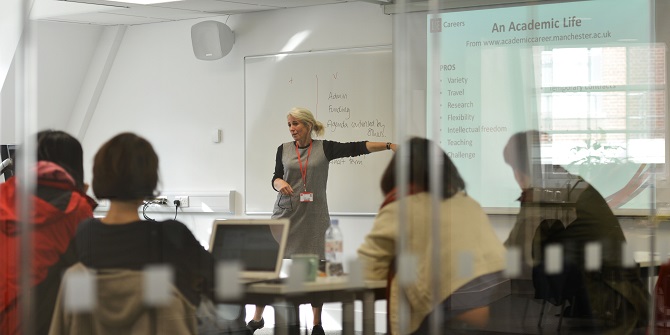Given that London is currently a global hub for numerous key industries, from finance to fashion, it’s not at all surprising that graduates wishing to stay in the UK will often consider the capital as their first option for that first job after graduation. London continues to host an array of central HQs for organisations across the world, and judging by the jobsites and vacancies across the sectors, it’s evident that the a significant number of graduate jobs are currently concentrated within the M25. However, it’s useful to check out other key and emerging locations on the island as part of your overall job search – fancy interning in Ipswich? Training in Tring? Shadowing someone in Sheffield? There are a whole host of new opportunities that emerge when you widen your horizons and to help you with this, we’ve outlined some of the advantages of doing so below:
Work comes in all shapes and sizes
Spiralling office costs and increased competition have encouraged larger companies to consider relocating to less expensive places outside of the capital – big names such as Intel, HTC, Microsoft and Adobe are all based along the M4 corridor with Tesco’s in Hertfordshire and Dyson in Wiltshire being some examples of large outfits operating in other parts of the UK. There are however many opportunities to work with smaller teams outside of London, the advantages of which are abundant: your level of involvement with, and impact on, business processes can be significant, and as a fresh graduate that can be exciting. There is also an increased exposure to key senior people and hence the potential for a steeper learning curve. The legal profession is a good example of this – many smaller, regional firms such as high-street brands offer the above advantages that are more difficult to secure in the larger city firms. A great example is LSE alumna Tanya Flower who works in Newport, Wales as an Assistant Economist in the Office for National Statistics (ONS). She advises that
perhaps controversially for some, my advice is don’t feel like you have to work in London. I spent three years there at university and there are lots of opportunities, but don’t have that as your be all and end all. There is so much to discover elsewhere in the UK. Here in Newport for example, we’re developing as the hub of statistical excellence for the UK. There really are so many other opportunities around the area as well…
Money matters
Let’s face it, you will likely be leaving University with a significant amount of money to pay back to your parents, your government or the bank. To avoid these debts spiralling, one choice may be to seek out a location where the living costs are slightly lower. As with most European countries, it’s often cheaper to live outside of the capital where the cost of rent and travel will be significantly less. In order to entice prospective employees to less traditional locations, companies sometimes offer attractive packages that are worth investigating too.
Living life to the full
Millennials are one of the key groups to be seriously attempting to readdress the work/life balance. It’s fast becoming one of the most important factors for this group when selecting their line of work and deciding on a particular organisation to kickstart their career. Smaller cities and less central towns still offer an equally as rewarding career path yet sometimes a less stressful commute and fewer late nights, offering more time to spend with family and friends and less of the lunch-at-your-desk problem! Obviously this is not a definite, and there are plenty of places where you will still work longer hours than the average, depending on the industry and time of the year. What is clear to note nonetheless is that a move outside of London is quite often decided upon with a view to a less hectic lifestyle in a less polluted city, and if you are the kind of person who thrives in a simpler, less frenetic environment, then it would be wise to start to research opportunities across the UK. There are plenty of documented success stories that reflect this choice.
Hunt out the Hubs
There are many exciting clusters currently popping up in different parts of the country. If an area has undergone a significant round of government or private funding to boost a certain industry, the subsequent result of this is an increase of jobs in that area. Tech North is one example of this – millions have been invested into projects and initiatives to hold Northern England up as a digital powerhouse and numerous startups and tech setups have moved there to develop amongst a like-minded community. Similarly, when the government incentivised and supported projects in the renewables field, there was a large demand for relevant labour at key locations across the UK where wind turbines were erected and solar plants were developed. There are also industries where London has never really been a central hub – manufacturing, for example, has its base in the Midlands, and there is a concentration of oil related jobs in Scotland, more specifically in Aberdeen. It’s crucial to follow the current trends in order to work out where both these emerging bubbles and established bases are found. Specialist recruitment companies may be able to offer helpful hints when it comes to the current state of things.
Cast your net wide
If you, for whatever reason/s, fail to make the desired grade and your conditional offer no longer stands, don’t worry – maximise your chances and don’t limit yourself to one area. Where the competition is highest, companies are less flexible, simply because they don’t need to be. It can therefore be useful to look further afield in order to widen your options and consider a larger number roles that are still open, less overcrowded but still offer the same high quality and competitive training programmes that you would find in a London-based role.
We can help!
So, as you start to see a bigger picture, you may be able to spot some opportunities that you hadn’t taken into account of before – if you’re interested in exploring alternative avenues, yet unsure as to how to approach this, careers consultants are on hand to run through these possibilities with you. Book an appointment via CareerHub to work through your options in more detail!






1 Comments